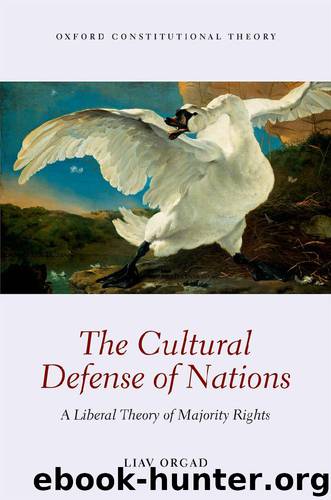The Cultural Defense of Nations: A Liberal Theory of Majority Rights (Oxford Constitutional Theory) by Liav Orgad

Author:Liav Orgad [Orgad, Liav]
Language: eng
Format: epub
Publisher: Oxford University Press
Published: 2015-11-05T08:00:00+00:00
PART II
LEGITIMATE AND ILLEGITIMATE DEFENSE
4
Illiberal Liberalism
If there is any principle of the Constitution that more imperatively calls for attachment than any other it is the principle of free thought—not free thought for those who agree with us but freedom for the thought that we hate. I think that we should adhere to that principle with regard to admission into … this country.
—The U.S. Supreme Court (1929)1
Cultural defense policies create a Paradox of Liberalism. Liberal democracies, in order to protect what they perceive as a liberal regime, resort to illiberal means that violate the same values they seek to protect. Herein lies the paradox. Either the liberal should tolerate illiberal practices, or turn to illiberal means in order to “liberate” the illiberal. Either choice undermines liberalism. The idea that one should adopt a liberal way of life as a prerequisite for living in a liberal society is, in itself, illiberal. This is because liberalism contains the freedom to choose not to hold liberal beliefs or live a liberal way of life as long as a person’s way of life complies with law and order.
The purpose of this chapter is threefold. The first purpose is to present two opposing approaches to naturalization. One approach—represented by current U.S. policy—does not engage in an investigation of a person’s belief in liberal values and institutions; the other approach—represented by current policy in some European states—emphasizes belief in liberal values and institutions. While both approaches have pros and cons, the chapter argues that, from a liberal perspective, the second approach has gone too far and is approaching the point of becoming illiberal. This is due to three reasons: state neutrality, liberal tolerance, and policy motivation. The second purpose is to show that joining a liberal state is frequently followed by a requirement to adopt a constitutional “story” in the sense of accepting its “truths.” The third purpose is to demonstrate several difficulties in evaluating normative aspects relating to cultural defense policies: their purpose is not clear, their effectiveness is a conundrum, and their lawfulness is yet to be clarified. Overall, the chapter illustrates risks involved in immigration and citizenship policies which, in order to protect liberal values, embrace illiberal means that violate those very same values.
Download
This site does not store any files on its server. We only index and link to content provided by other sites. Please contact the content providers to delete copyright contents if any and email us, we'll remove relevant links or contents immediately.
Cecilia; Or, Memoirs of an Heiress — Volume 1 by Fanny Burney(32549)
Cecilia; Or, Memoirs of an Heiress — Volume 2 by Fanny Burney(31948)
Cecilia; Or, Memoirs of an Heiress — Volume 3 by Fanny Burney(31932)
The Great Music City by Andrea Baker(31918)
We're Going to Need More Wine by Gabrielle Union(19037)
All the Missing Girls by Megan Miranda(15965)
Pimp by Iceberg Slim(14489)
Bombshells: Glamour Girls of a Lifetime by Sullivan Steve(14061)
For the Love of Europe by Rick Steves(13950)
Norse Mythology by Gaiman Neil(13351)
Talking to Strangers by Malcolm Gladwell(13351)
Fifty Shades Freed by E L James(13234)
Mindhunter: Inside the FBI's Elite Serial Crime Unit by John E. Douglas & Mark Olshaker(9326)
Crazy Rich Asians by Kevin Kwan(9280)
The Lost Art of Listening by Michael P. Nichols(7497)
Enlightenment Now: The Case for Reason, Science, Humanism, and Progress by Steven Pinker(7307)
The Four Agreements by Don Miguel Ruiz(6747)
Bad Blood by John Carreyrou(6613)
Weapons of Math Destruction by Cathy O'Neil(6267)
